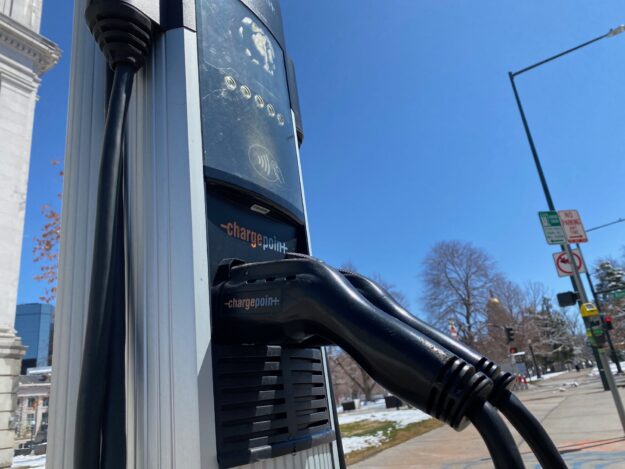Widgetized Section
Go to Admin » Appearance » Widgets » and move Gabfire Widget: Social into that MastheadOverlay zone
Colorado upgrades electric vehicle plan as sales topped 10% market share in 2022

More than 1 in 10 new cars sold in Colorado in 2022 were electric vehicles, and state officials on Thursday laid out their plans to accelerate a “large-scale transition of Colorado’s transportation system” and reach nearly 100% EVs by 2050.
The 2023 Colorado EV Plan updates plans previously released by the state transportation and energy agencies in 2018 and 2020, which aim to incentivize the switch to EVs through a variety of tax credits, clean-air rules and investments in charging infrastructure statewide. Gas-powered vehicles are among the state’s largest sources of climate-warming greenhouse gas emissions — and among the most difficult sectors, officials have said, in which to achieve emissions cuts.
Data released by the Colorado Automobile Dealers Association earlier this year showed that 10.5% of new vehicles sold in the Centennial State were electric models — the fifth-highest figure of any state in the country, and a nearly three-fold increase over just the last three years.
“This progress continues despite setbacks from the COVID-19 pandemic and associated supply chain disruptions, which have created challenges and delays for both charging infrastructure and electric vehicle access,” the state’s plan says.
Officials say the state “appears to be on track” to meet an interim goal, set in the state’s first EV plan in 2018, of putting nearly 1 million passenger EVs on Colorado’s roads by 2030. The state has also set new goals for increasing the number of medium- and heavy-duty vehicles that are electric-powered, aiming to reach 35,000 zero-emission trucks and buses by the same date.
To meet the goals, Colorado can now count on substantial support from the federal government, in the form of the EV tax credits passed as part of last year’s Inflation Reduction Act, in addition to funding for charging stations in the 2021 bipartisan infrastructure law. State-level policy like a $5.3 billion transportation funding law passed in 2021 and commitments from utilities like Xcel Energy will also help support efforts to electrify the transportation sector.
But environmental groups have consistently called on the state to be more aggressive, including by speeding up adoption of clean-trucking rules, which regulators are set to finalize this year after delays that frustrated climate-action advocates.
Reacting to the release of the new EV plan, advocates also said the state is “not fully embracing its most powerful policy lever” — a policy known as Advanced Clean Cars, which seven states led by California have adopted. It would ban the sale of new gas-powered light-duty vehicles by 2035.
Colorado’s modified version of the Advanced Clean Cars rule, announced by state energy officials in December, would increase the required percentage of new EV sales to 80% by 2032, but stop short of California’s 2035 ban. The state’s Air Quality Control Commission is expected to take up the rule later this year.
“Ending the Clean Car standards in 2032, as is proposed now, would result in Colorado missing out on substantial economic, air quality, and climate benefits,” Alana Miller, Colorado policy director with the Natural Resources Defense Council, said in a statement. “The Air Quality Control Commission should give full consideration to the benefits of Advanced Clean Cars and fully adopt the rule through 2035. Coloradans can’t settle for a field goal when a touchdown is just inches away.”
Editor’s note: This story first appeared on Colorado Newsline, which is part of States Newsroom, a network of news bureaus supported by grants and a coalition of donors as a 501c(3) public charity. Colorado Newsline maintains editorial independence. Contact Editor Quentin Young for questions: info@coloradonewsline.com. Follow Colorado Newsline on Facebook and Twitter.


